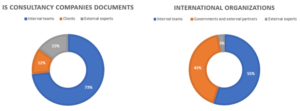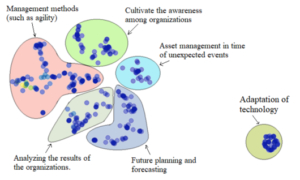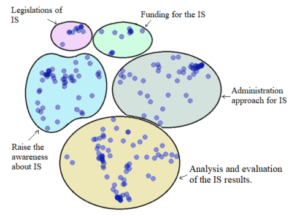Citation
L'auteur
Oussama ABIDI
(oussamaabidi5@gmail.com) - (Pas d'affiliation)
Copyright
Déclaration d'intérêts
Financements
Aperçu
Contenu
Both stakeholders share a need for effective communication about their actions and decisions. Formal communication plays a critical role in IS management, and there is a noted gap in research on this communication, particularly facing unexpected events (Coulon et al., 2023; Benabid, 2020).
Acknowledging this gap, our central research question emerges as: What drives the communication strategies of IS consultancy companies and international organizations during unexpected events ?
To answer this question, we adopt legitimation discourse framework, which analyzes both content of communications and underlying motives and strategies used to legitimize actions (Van Leeuwen, 2007). This paper contributes to academic literature on legitimation discourse by examining the behavior of two IS stakeholders facing unexpected events. Moreover, this will deepen our understanding of the communication strategies’ motivations, recognizing that these communications can significantly impact the IS projects—either positively or negatively.
This paper begins with a theoretical background, followed by an analysis using topic modeling to evaluate communications. This paper concludes with a comparison of findings and offers insights and suggestions for future research.
Theoretical background
In this paper, unexpected events are treated as defined by Coulon et al. (2023). According to their definition, unexpected events are unanticipated occurrences that have already happened and can have both positive or negative effects on organizations. These events often present challenges, such as disruptions to schedules, budgets, and stakeholder confidence, but they may also drive innovation and cultural change (Weick, 1998). Notable examples include cyberattacks (Dupont, 2022), COVID-19 pandemic, 2011 tsunami, and the 2008 financial crisis.
As a presentation of Van Leeuwen’s (2007) discourse legitimation framework, we can identify four key categories. The first is authorization, which establishes authority through expertise or impersonal rules. The second is moral evaluation, where actions are justified on ethical grounds. The third is rationalization, which uses logic and reasoning to legitimize decisions. Finally, mythopoesis involves constructing narratives to support ideologies. These categories highlight the complexity of legitimation in shaping both narratives and power structures.
Results
This section delves into the analysis of both IS stakeholders’ communications following our methodological approach.
Context of the study
Over recent years, IS projects progress has heightened vulnerabilities in areas such as hardware, software, networks, and management (Brumă, 2020). The various unexpected events encountered by IS stakeholders have amplified their vulnerabilities, highlighting the need to explore their communication dynamics through the lens of legitimation discourse.
Our analysis explores discourse strategies in the selected documents, revealing a range of positions as presented in the following table.
table,th,td {border: solid black; border-collapse: collapse;}
| IS stakeholder | Narratives for success stories | Analysis of unexpected events. | Presentation of perspectives for the future. |
|---|---|---|---|
| IS consultancy companies | 20% | 37% | 43% |
| International organizations | 2% | 43% | 45% |
Moreover, our documents reveals that we have a range of sources, including internal team assessments, external IS experts, and client feedback.

In the next paragraph, we will delve into the diverse discourse legitimation categories employed in these documents.
IS consultancy companies
Our analysis of the documents identified several topics that can be grouped in six clusters depending on the used vocabulary as presented in the following table.
| N° | Cluster name | List of top cluster words |
|---|---|---|
| 1 | Cultivate the awareness among organizations | raise, awareness, visibility, avoid, understanding, aware, engagements, agreement, culture, cultivate, training, workshops, monitoring. |
| 2 | Asset management in time of unexpected events. | assets, finance, resources, wealth, business, portfolio, performance, assurance, recovery, operations. |
| 3 | Management methods | agility, optimization, attribution, work, metrics, continuous, assist, efficiency, process, methods, decision, governance, assumptions, strategies, |
| 4 | Adaptation of technology | adapt, technology, Artificial Intelligence, cloud, digital twin, information system, machine learning, internet of things, design, software, cybersecurity |
| 5 | Analyzing the results of the organizations. | average, amount, dashboard, results, trends, services, analysis, benefits, failure, deficit, outcomes, Return on Investment. |
| 6 | Future planning and forecasting | amelioration, ambition, anticipate, planification, 21st century, future, forecasting, roadmap, projections, vision. |
These clusters can be illustrated based on their vocabulary and using the T-SNE diagram, as shown in the following figure.

-
-
- Description of the results
-
Starting our analysis, moral evaluation legitimation emerges in the initial cluster of topics related to “awareness” activities. Documents from Accenture (2021) emphasize data privacy, ethical design, and governance, placing a priority on trust in IS products and services. Similarly, McKinsey (2020) highlights the dual influence of technology, calling for a deeper reflection on ethics, data privacy, and information protection, underscoring a commitment to social responsibility and equity in healthcare.
From a rationalization legitimation perspective, four key clusters emerge (cluster 2, 3, 4, and 5). Terms like “evaluate”, “agility”, “asset”, and “amelioration” emphasize resource optimization and agility, particularly in response to COVID-19 pandemic. Agile management is represented as crucial for adaptability, with some companies advocating for swift actions to enhance software performance. McKinsey (2020) also explores the challenges faced by public healthcare IS during the pandemic, along with the technological efforts made to address them.
Lastly, mythopoesis legitimation appears in the sixth cluster, where IS consultancy companies focus on constructing narratives and forecasts about the future of IS. Terms such as “ambitions” and “assumptions” help reinforce client identities and prepare them for upcoming changes. Accenture (2021) emphasizes its commitment to societal and environmental values, which resonates with clients. Similarly, other companies highlight technologies that transform data into actionable insights, while also showcasing cloud transformation solutions that align with client objectives and enhance marketing value through identity-building.
-
-
- Analysis of the results
-
Analyzing these three legitimation categories reveals that IS consultancy companies primarily focus on tangible achievements in IS projects, positioning themselves as advisors by showcasing their expertise and proposing ethical, forward-looking solutions. Their motivation for such communication originates from the need to highlight their success stories, retain existing clients, secure new contracts of IS implementation, and reduce the financial impact of unexpected events, such as service contract disruptions.
In our study, we did not identify the authorization legitimation category, as the documents lacked corresponding terms and topics. This absence is logical since these companies, particularly during unexpected events, are not in a position to enforce solutions; they face numerous client-related challenges and serve only in an advisory capacity. It is the clients, as the paying entities, who determine and specify the required solutions. Another observation from our research is that the communication analyzed highlights success stories while excluding failures. The documents concentrate on analyzing client challenges and emphasizing how IS consultancy companies effectively address them. Management teams receiving such communication should remain mindful of its promotional and sales nature.
International organizations
Our analysis of the documents identified several topics that can be grouped in five clusters depending on the used vocabulary as presented in the following table.
| N° | Cluster name | List of top cluster words |
|---|---|---|
| 1 | Analysis and evaluation of the IS results. | analysis, applications, announce, future, amelioration, adjustments, award, data, audit, statistics, availability, evaluation, quality |
| 2 | Administration approach for IS | administrator, regulations, agreements, reporting, strategy, governance, infrastructure, stakeholders. |
| 3 | Raise the awareness about IS | awareness, raise, attacks, safe, privacy, education, best practices, training, literacy, workshops, campaigns. |
| 4 | Funding for the IS | amount, funding, approved, finance, payment, budget, investment, donate, fiscality, economy |
| 5 | Legislations of IS | regulation, legal, laws, treaties, transparency, measures, sovereignty, control, conventions, protocols. |
These clusters can be illustrated based on their vocabulary and using the T-SNE diagram, as shown in the following figure.

-
-
- Description of the results
-
In our study, authorization legitimation is evident in three clusters (clusters 2, 4, 5), with terms like “regulation,” “funding,” and “agreement”. This global perspective aids regulatory and financial decisions. For instance, regulations on accounting practices support effective taxation, requiring IS adaptations. European Parliament (2020) highlights the funding and agreements focused on transitioning education online. Moreover, they address legal challenges in deploying emerging technologies during public health emergencies.
Moreover, moral evaluation legitimation in this study is evident in the third cluster, focusing on raising awareness through terms like “awareness,” “safe,” and “privacy.” International organizations assess IS from ethical standpoints, particularly during unexpected events such as wars and natural disasters, promoting safe IS practices. For instance, some organizations use IS to enhance ethical awareness. United Nations (2022) highlights the ethical issues of emerging technologies like Artificial Intelligence and machine learning, emphasizing transparency and accountability, especially while handling sensitive health data.
Finally, rationalization legitimation in this study is highlighted in the first cluster, focusing on the analysis and evaluation of IS outcomes through terms like “analysis,” “amelioration,” and “adjustment.” International organizations showcase successful IS projects, emphasizing the role of technology in supporting struggling IS companies during unexpected events and promoting investments in sectors such as AGRITECH. World Economic Forum (2023) highlights the synergy between AI and agriculture, enhancing efficiency and addressing food security.
-
-
- Analysis of the results
-
Analyzing these three legitimation categories reveals that international organizations emphasize their authority by highlighting their supervisory roles, moral motivations, and collective benefits. Their communication often focuses on success stories related to regulations and funding, with an emphasis on privacy, technological advancements, and ethical governance. The motivation behind such communication is rooted in promoting regulations that serve the greater good and advance technology responsibly.
In our study, we did not identify the mythopoesis legitimation category in the analyzed documents. This absence can be explained by the focus of these organizations on their supervisory role and success stories, rather than constructing narratives that support specific ideologies. Furthermore, the communication often neglects the challenges that international organizations face, such as their advisory guidance, which is not mandatory for all countries and organizations. As a result, their recommendations may have limited impact and often remain vast, without considering the unique circumstances of each organization. Management teams receiving this communication should be aware of its global nature and consider the specific needs and conditions of their own organizations when applying these guidelines.
Conclusion
This analysis examined the communications of IS consultancy companies and international organizations through the framework of legitimation discourse (Van Leeuwen, 2007), revealing differences in their motivations and strategies. The IS consultancy companies positioned themselves as strategic partners, offering proactive solutions and strategies to retain and gain clients during unexpected events. In contrast, international organizations focused on their supervisory roles, emphasizing regulations, funding, and collective benefits.
This study contributes to the literature by addressing communication gaps identified by Coulon et al. (2023) and Benabid (2020), enhancing our understanding of communication dynamics during crises. For management, these insights provide a clearer understanding of the motivations behind the communication strategies of both stakeholders, aiding more informed decision-making.
However, our study faced limitations in terms of sampling, as it primarily focused on COVID-19 pandemic and cyberattacks. Additionally, the document corpus was limited to communications centered on marketing and sales. Future research could expand the scope by analyzing a broader set of documents, examining interactions between these stakeholders, and shedding light on potential conflicts, collaborations, and the impact of legitimation discourse within organizations.
Bibliographie
Accenture (2021), Technology vision 2021, Leaders wanted : Experts at change at a moment of truth.
Benabid, M. (2020). Covid-19 : Un challenge pour la communication de crise. Management et Data science, 4(2). https://doi.org/10.36863/mds.a.12904.
Brumă, O, V. (2020). Vulnerabilities of Information Systems. International Journal of Information Security and Cybercrime. (9)1. 9 – 14. https://doi.org/10.19107/IJISC.2020.01.01.
Coulon, T., Paré, G., & Barki, H. (2023). Unexpected Events in IT Projects: A Conceptual Review and Research Agenda. Communications of the Association for Information Systems, 52, 877-909. https://doi.org/10.17705/1CAIS.05242.
Coombs, C., Hislop, D., Taneva, S. K., & Barnard, S. (2020). The strategic impacts of Intelligent Automation for knowledge and service work : An interdisciplinary review. The Journal of Strategic Information Systems, 29(4), 101600. https://doi.org/10.1016/j.jsis.2020.101600
Dupont, B. (2022). La cyber-résilience en pratiques : sensemaking, préparation et adaptation. Management et Data science, 7(1). https://doi.org/10.36863/mds.a.21908.
European parliament (2020), Ten technologies to fight coronavirus.
McKinsey (2020), Retail practice : Fashion’s digital transformation : now or never.
Stockhinger, J., Teubner, R.A., (2018). How Management Consultancies Make Sense of Digital Strategy. In: Proceedings of the 39th International Conference on Information Systems (ICIS 2018), San Francisco, USA.
United Nations (2022), ECLAC Digital technologies for a new future.
Varenne, P., & Godé, C. (2021). Transformation digitale : vers un Business Model Digital Dynamique (BMD2). Management et Data science, 5(3). https://doi.org/10.36863/mds.a.16269.
Van Leeuwen, T. (2007). Legitimation in discourse and communication. Discourse & Communication, 1(1), 91‑112. https://doi.org/10.1177/1750481307071986
Weick, K. E. (1998). Improvisation as a mindset for organizational analysis. Organization Science, 9(5), 543-555. https://doi.org/10.1287/orsc.9.5.543.
World economic forum (2023), Scaling AGRITECH at the last mile: converging efforts for farmer’s prosperity.
